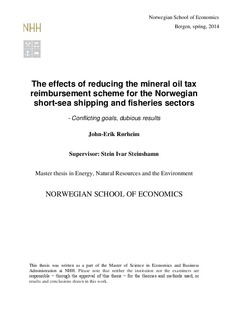The effects of reducing the mineral oil tax reimbursement scheme for the Norwegian short-sea shipping and fisheries sectors : conflicting goals, dubious results
Master thesis
Permanent lenke
http://hdl.handle.net/11250/223200Utgivelsesdato
2014Metadata
Vis full innførselSamlinger
- Master Thesis [4372]
Sammendrag
This thesis conducts an analysis of the effects of reducing the mineral oil tax reimbursement scheme for the Norwegian short-sea shipping and fisheries sectors. An important contribution of this study is to review this measure in a wide context based on the Norwegian governments’ principles and goals relating to climate, environment and its goals for the short-sea shipping and fisheries sectors. Based on the dynamics of supply- and demand elasticities for the sectors, the likely tax-incidence determined. The tax incidence is in turn used to discuss and contrast the different outcomes of the tax increase for the sectors.
Costs are expected to rise by at least 2.2 % for the short-sea shipping sector and 0.9 % for the fisheries sector. This increase will fall on the vessel- and ship-owners based on the tax incidence. In terms of the principles and goals for environmental taxes the effort is found to be a step in the right direction, but falling short of estimates of the social cost of carbon.
The tax is found to be better for the fishing industry than the short-sea sector. Short-sea has environmental benefits over its closest competitors and the tax increase may shift volume to other modes of transport. Thus the measure may result in increased emissions from transport. Both effects undermine the goals for the short-sea sector. For fisheries sector some goals may be achieved with regards to profitability, reduced overcapacity/redundancy and investment in new technology. This may reduce emissions in the long run, but not in the short run because of perfectly inelastic supply due to fishing quotas.
Going forward the reimbursement scheme should be held constant for the short-sea shipping sector at least until other sector goals are achieved. For the fisheries sector however, the reduction of the reimbursement should continue.
